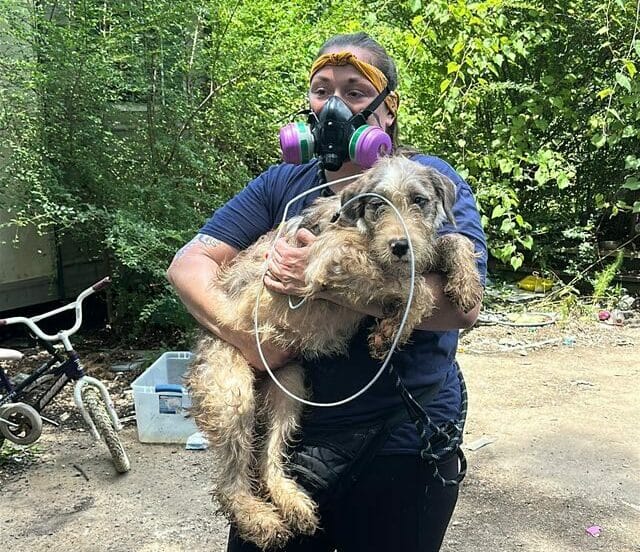Answered in Hours: The Volunteers Who Saved 3 Children and 34 Animals in Bienville Parish
Volunteers race to rescue children and 34 animals from neglect in Louisiana—proving how community care, animal welfare and swift response saves lives

The call came in on a Tuesday afternoon. By Friday morning, a convoy of volunteers had driven over 570 miles through the night, loaded with medical supplies, transport cages and a state-licensed veterinarian. They weren’t heading to a natural disaster – they were racing to save three children and 34 animals trapped in what authorities would later call a ‘house of horrors’ in Bienville Parish, Louisiana.
When someone dials for help in an animal rescue emergency, the volunteers who answer don’t hesitate. They drop what they’re doing, grab supplies and head out – because lives depend on how quickly they can get there.
The Call That Changed Everything
It started with a routine welfare check. Louisiana’s Department of Children and Family Services had received concerns about children’s safety at a property southeast of Shreveport. What authorities found when they arrived told a different story entirely – not just three children in danger, but a house being used as an illegal animal rescue called Hope Angels Rescue, with over 30 dogs and cats trapped in horrific conditions.
The children were removed immediately on Tuesday. Then the Bienville Parish Sheriff’s Office made the call that would bring help racing from across the country – contacting Animal Rescue Corps, a national organisation that specialises in large-scale emergency rescues when local resources aren’t enough.
Volunteers Who Don’t Wait
Animal Rescue Corps has built its reputation on rapid response. Since 2010, they’ve handled over 300 rescue operations – from hoarding cases involving 65 animals to breeding operations with 60 dogs – always relying on volunteers who understand that emergency means emergency.
‘There was no time to waste,’ said Tim Woodward, Animal Rescue Corps’ Executive Director. ‘We were on the road within two hours of getting the call and drove over 570 miles to get here and save these poor animals.’
Supporting them on-site was Animal Rescue New Orleans, a volunteer-based organisation that’s been responding to local crises since Hurricane Katrina. Founded in 2006, ARNO knows what it means to mobilise quickly when animals and families need help most. Like other support networks for first responders, these volunteers understand that showing up matters most when someone’s world has fallen apart.
What Awaited the Rescuers
The scene that greeted volunteers wasn’t just neglect – it was systematic deprivation. Twenty-nine dogs and five cats were found living in inches of faeces and urine, with ammonia levels so high that rescuers needed protective equipment. Most animals were locked in filthy wire cages with no access to food or water. Many couldn’t even lift their heads when help finally arrived.
The children’s living conditions matched the animals’ suffering. In one child’s room, dirty nappies were piled knee-deep. What little food existed in the house was locked away from both the children and animals behind a pantry door.
For volunteers who’ve seen countless rescue scenes, the emotional impact never lessens. Each cage opened, each animal lifted to safety, means another chance at life.
The Rescue in Action
Emergency animal rescue involves more than just removing animals from danger. Each of the 34 animals was individually assessed on-site, documented for potential legal proceedings and given immediate care by the veterinarian travelling with the team. The entire operation – dubbed Operation Pressure Cooker – required transport vehicles, medical supplies, assessment equipment and the kind of coordination that only comes from experienced volunteers working together.
The dogs are now being transported to ARC’s Rescue Centre in Gallatin, Tennessee, where they’ll receive comprehensive medical exams, vaccinations and any necessary treatments. The goal is rehabilitation that prepares these animals for new homes and families.
After the Emergency
The immediate rescue is only the beginning. At ARC’s facility, each animal will receive the medical, physical and social care needed to overcome trauma and neglect. Veterinary rehabilitation programmes can restore mobility and quality of life for animals who’ve suffered serious injuries or prolonged neglect, enabling them to recover and thrive in adoptive homes.
Animals who arrive barely able to lift their heads go on to live active, fulfilling lives. The three children removed from the Bienville Parish property now have the safety and support they need to heal and grow. Specialist care facilities understand that recovery takes time, patience and the right environment.
How Your Support Makes This Possible
Matching challenges like the one being offered by Fran – who’s pledged to match up to $15,000 in donations – work because they multiply impact. Studies show that mentioning matching gifts can increase response rates by over 70%, but more importantly, they help donors see how their contributions translate into concrete help.
Your $25 becomes $50 for medical supplies. Your $100 becomes $200 for transport and veterinary care. Even small donations, when matched and combined with others, fund the vehicles, medicine and round-the-clock care that make rescues like Operation Pressure Cooker possible.
Volunteer opportunities with organisations like Animal Rescue Corps and Animal Rescue New Orleans range from hands-on rescue work to fostering, transport and fundraising support. A few hours of volunteer time can mean the difference between an animal receiving immediate care or waiting days for help that might come too late. Similar to community-led support networks, these volunteer groups show how ordinary people can create extraordinary change.
Why They Answer the Call
The volunteers who drove through the night to reach Bienville Parish understand something fundamental about emergency response – that the window for saving lives is often measured in hours, not days. When Tim Woodward says there was no time to waste, he’s speaking from experience with over 300 rescue operations where rapid response meant the difference between life and death.
Darci Freligh Boyd, the 41-year-old woman arrested and charged with animal cruelty and cruelty to juveniles, is being held on $20,000 bond. For the volunteers, though, the legal proceedings are secondary to what matters most – that 34 animals and three children are now safe, receiving care and moving towards brighter futures.
The volunteers who answer these calls aren’t heroes in some distant story. They’re ordinary people who’ve decided that when someone – human or animal – needs help, waiting isn’t an option. Their willingness to drop everything and drive through the night is what turns desperate situations into rescue success stories. Like high-profile animal welfare champions, these everyday heroes prove that saving lives starts with showing up.





